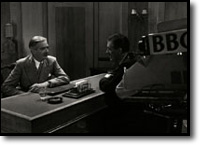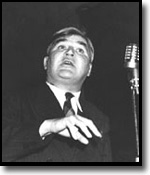
|
25 October 1951The ageing Conservative leader Winston Churchill won the 1951 election with a comfortable majority. The Conservatives were back in power once more, but they did little to alter the welfare state created by the previous Labour government. With Churchill approaching retirement, attention was focussed on when he would he step aside to enable his successor to take the helm.
Background
The Government's foreign and domestic policies seemed to be faltering. Herbert Morrison replaced Bevin's sure hand at the Foreign Office with an uncertain approach. As crises arose in Iran, Egypt, Sudan and Europe, Morrison looked unable to cope. The Government was further embarrassed by the defection of diplomats Guy Burgess and Donald Maclean to the Soviet Union in May 1951. In June 1950, communist North Korea invaded South Korea sparking the first major conflict of the cold war. As allies of the USA, Britain sent troops to support America's defence of South Korea. The cost of the war had disastrous effects on Britain's economy and on Attlee's government. Hugh Gaitskill, the new Chancellor, was forced, among other things, to impose perscription charges on National Health glasses and false teeth. This prompted the resignation of two Cabinet ministers, Nye Bevan and Harold Wilson. To cap it all, the Government coped badly with a balance of payments crisis in the summer of 1951 which led to speculation against sterling. With the Government looking increasingly unstable, Attlee dissolved Parliament at the beginning of September and called the election for 25 October 1951.
The Tories, by contrast, started an upbeat campaign with a seven point lead over Labour. With the nation at war in Korea, Churchill played up his successful wartime record. The Tories also promised to reduce rationing and ease the housing shortage by building upwards of 300,000 houses a year. As the campaign dragged on, the Labour Party and its supporters in the press accused the Tories of warmongering. The left-leaning newspaper The Daily Mirror printed a front-page headline which shouted "Whose Finger is on the Trigger". Churchill, furious with the paper's accusation that he was a war monger, later took the Mirror to court. Labour's negative attacks on the Tories seemed to make an impression. Accusations of warmongering and reminders of the Tories' record on unemployment were both used to frighten voters. By the time the voters went to the polls the Tories lead had dropped to just 2.5%.
Results
As the results came in, it became clear that Winston Churchill had won his first general election. But the majority was not as large as many of his supporters had expected. The Tories polled 48% of the vote and won 321 seats to Labour's 48.8% and 295 seats. The Conservatives enjoyed a swing from Labour of just over 1%. Despite polling nearly 14 million votes, the record number of votes recorded by any British political party in any election to that time, Labour lost.
The Liberals did badly and took just six seats. Lady Megan Lloyd George lost her Anglesey seat after 22 years of occupation. Due to a lack of funds, few Liberal candidates stood. Therefore, those who couldn't vote Liberal and wanted to vote against the Government had to vote Tory.
The voter turnout was lower than the previous election and this seemed to favour the Conservatives. Winston Churchill was back in power and although he did not have a large majority he could be sure his Government would run till the end of the new Parliament. Britain's brief period of instability was, for the time being, over.
|
Diana, Princess of Wales, 1961-1997
Conference 97
Devolution
The Archive
News |
Issues |
Background |
Parties |
Analysis |
TV/Radio/Web
Interactive |
Forum |
Live |
About This Site
News |
Issues |
Background |
Parties |
Analysis |
TV/Radio/Web
Interactive |
Forum |
Live |
About This Site
© BBC 1997 |
politics97@bbc.co.uk |

